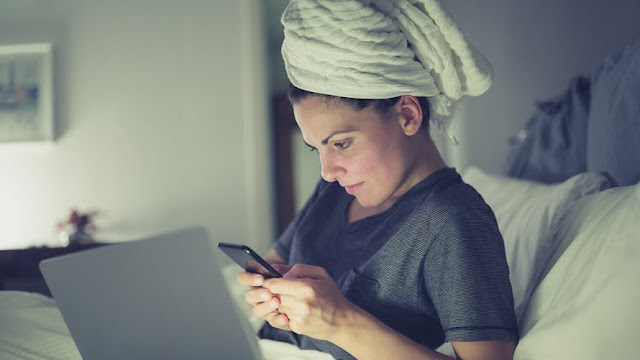The risks of illness or significant damage to hair and skin when going to bed with a wet head exist, but are very limited. Discover the possible inconveniences of this habit as well as some useful recommendations for maintaining healthy hair!
If you shower before bed , you may be wondering if sleeping with damp hair is a problem. You probably hear the voice of your parents or grandparents telling you that you are going to get sick and damage your hair. But what really is this habit?
Should you dry your hair before sleeping?
Lack of time, sports session... Do you have any other choice than to wash your hair in the evening? If they are not completely dry, leave them loose so that they dry completely in the open air, or blow dry with a hairdryer ( always favoring air drying).
Indeed, sleeping with wet or damp hair can cause some inconvenience. Studies cited by Time (source 1) have shown that pillows , especially those made with synthetic materials, can contain mold and fungi that trigger asthma or allergies . These microorganisms tend to thrive in warm, humid environments , just like dust mites .
However, rest assured: if the idea that catching a cold endangers our health is a myth well established in our cultures, the bacteria and viruses responsible for illness do not appear spontaneously, so you are not in any danger of illness. when you go to bed with wet hair .
Sleeping with wet hair: what are the effects?
As for hair and skin health, there may be legitimate reasons to want to avoid going to bed with a wet head too often. After a few weeks or months, water can break down the protective outer layer of the hair follicle, called the cuticle.
Once this cuticle breaks down, water can penetrate it and break the inner cortex of the follicle. The resulting damage can lead to hair breakage, loss of shine and elasticity . The hair, which has become porous, is also more sensitive to external aggression.
Concerning the skin, wet hair on the face could cause slight irritation and dry skin . But most people who sleep with wet hair seem to suffer no problems. In certain cases, specifies Time , a drop in body temperature would even help you fall asleep more easily . It's up to you to weigh the pros and cons.
How not to damage your hair at night?
If it's late and you really can't dry your hair for X or Y reason, don't feel guilty: it's the regularity more than the action itself that counts, and there are few You may develop folliculitis because you go to bed with wet hair every once in a while .
If you suffer from a stuffy nose, itching, watery eyes and breathing problems that may indicate the presence of an allergy or asthma, do not hesitate to take a few steps in your room to limit exposure to irritating elements: for example, you can wash your pillowcases and your sheets in hot water at least once a week . Also opt for a silk or satin pillowcase if you can.
If you still go to sleep with wet hair, take the opportunity to apply a leave-in night treatment before going to bed. It will always be a win!
Sleeping with your hair tied up, a good idea?
When you sleep with your hair down, friction on the pillowcase can weaken the lengths . Don't hesitate to make a ponytail or a braid, but be careful, not just any way! It is important not to tighten the hair too much, and preferably use a silk elastic.
Source 1: “ Is It Bad to Sleep With Wet Hair? ”, Time Magazine, Markham Heid, 02/20/2109.


0 Comments